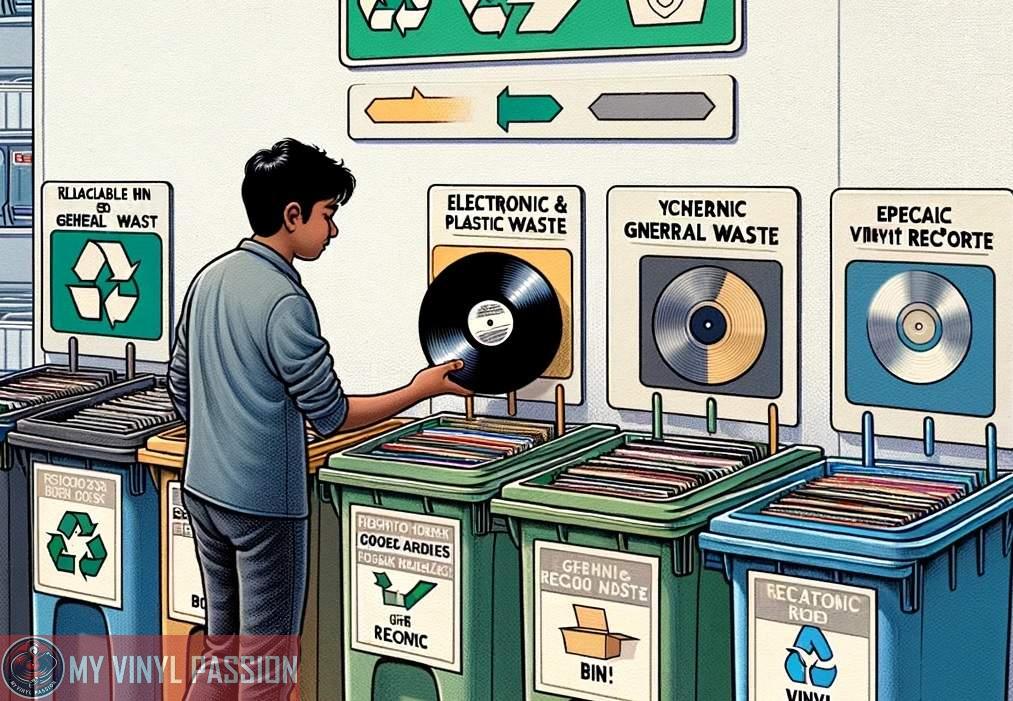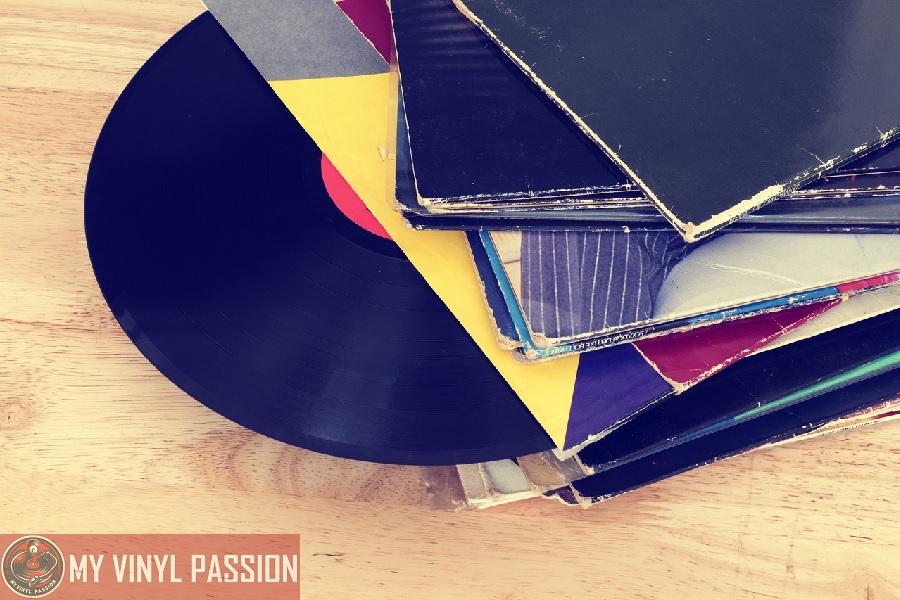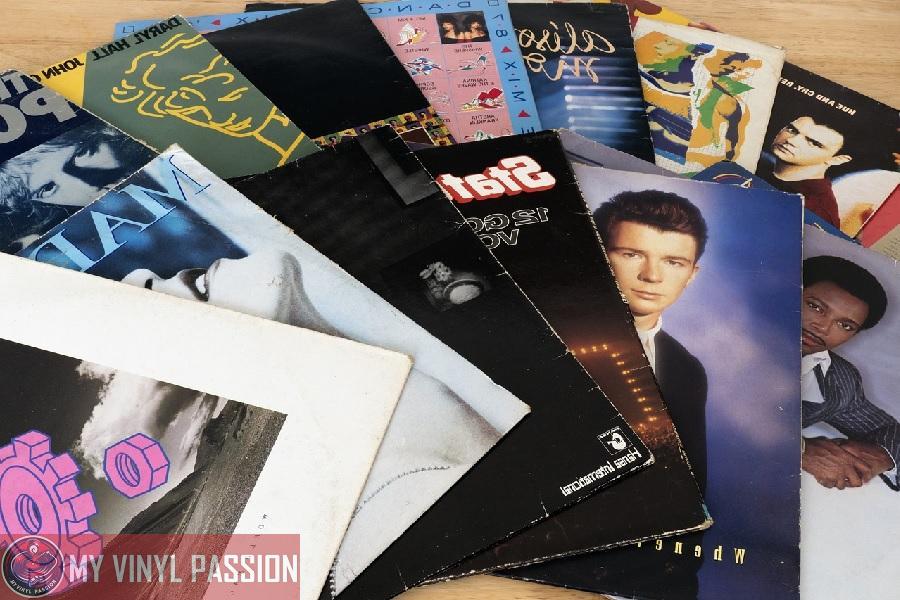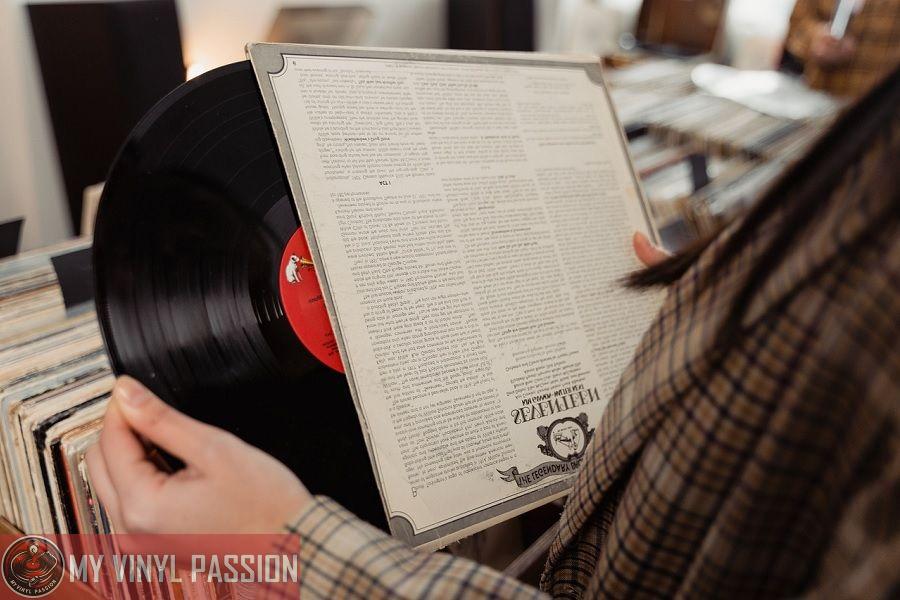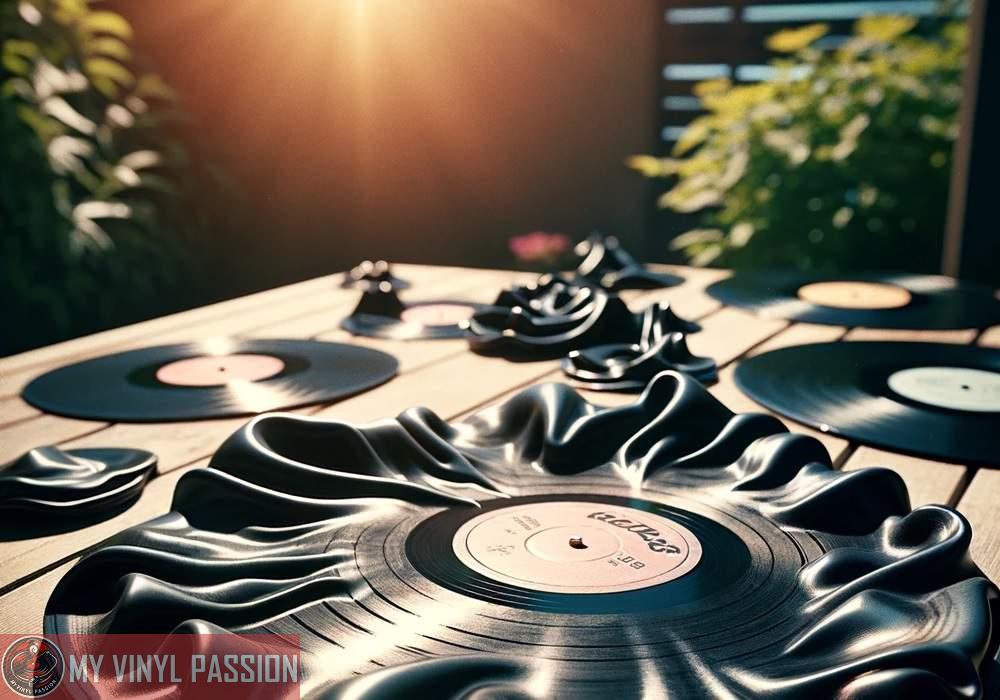Vinyl records hold a special place in the hearts of music lovers and collectors.
However, there comes a time when you might need to dispose of them, either because they are damaged or you simply no longer have a use for them.
Disposing of vinyl records can seem challenging; you want to do it in an environmentally friendly way and, if possible, give these once-cherished items a new purpose.
In Summary
Discover environmentally friendly options for disposing vinyl records
Consider selling, donating, or recycling records instead of throwing them away
Creative reuse and community involvement can give new life to old vinyl records
Before you dispose of your vinyl records, it’s important to understand the various options available to you. There are ways to recycle them, donate them to good causes, or even repurpose them into unique art and crafts.
All of these options can minimize the environmental impact of throwing away something that could still bring joy to others.
Understanding Vinyl Records
Components of Vinyl Records
Vinyl records are made from polyvinyl chloride (PVC), a synthetic plastic material. They consist of three primary components: the PVC base, a label in the center, and a protective layer of lacquer over the grooved surface.
The grooves of the record contain the audio information, which is picked up by a needle or stylus as it traces the spiral path.
Lifespan and Degradation
The lifespan of a vinyl record depends on how well you take care of it. With proper handling, storage, and cleaning, records can last for decades. However, over time, they can accumulate dust and grime that can affect sound quality.
Additionally, excessive handling and exposure to sunlight, heat, or humidity can lead to warping, scratches, and other damage, thus reducing their lifespan.
Here are some guidelines for proper care:
- Clean your records regularly using a record cleaning brush or specialized cleaning solution.
- Store them vertically and away from direct sunlight or heat sources.
- Handle them by their edges, avoiding contact with the grooved surface.
Environmental Impact
As vinyl records are made primarily from PVC, a non-biodegradable material, their disposal has a significant environmental impact.
When sent to a landfill, vinyl records take a long time to break down. Moreover, they release chlorine and other harmful substances while degrading.
Additionally, the manufacturing process of PVC involves the use of toxic chemicals, such as heavy metals, posing risks to both human health and the environment. Here are some more environmentally friendly alternatives:
- Recycling: Look for specialized recycling facilities or programs that accept PVC or vinyl records for repurposing or recycling.
- Repurposing: Instead of disposing of your records, consider repurposing them into various household items or artworks.
- Supporting sustainable alternatives: Look for biodegradable or more sustainable materials when purchasing new records or repurposing existing ones.
By understanding the components, lifespan, degradation, and environmental impact of vinyl records, you can make better decisions about how to care for, dispose of, and choose more eco-friendly alternatives in the future.
Preparation for Disposal
Sorting Vinyl Records
Before you dispose of your vinyl records, it’s essential to sort them out. Categorize your records by their values, such as rarity, desirability, and age. This will help you determine which ones to keep, sell, donate, or discard. A simple way to sort your collection is by using the following table:
| Category | Description |
|---|---|
| Keep | Records with high sentimental or monetary value |
| Sell / Donate | Records in good condition with moderate value or appeal |
| Dispose | Damaged or worn records with minimal value or interest |
Condition Assessment
To properly assess the condition of your vinyl records, follow these steps:
- Inspect the record sleeve: Check the cardboard cover for tears, water damage, mold, or other signs of wear or damage. A damaged sleeve may decrease the value of the record.
- Assess the record condition: Carefully hold the record by its edges and evaluate the surface for scratches, dirt, or other imperfections. You can use the following scale to grade the condition of your records:
- Mint (M): Perfect, no flaws
- Near Mint (NM): Nearly perfect, minimal signs of wear
- Very Good Plus (VG+): Some wear, but still plays well
- Very Good (VG): Noticeable wear and surface noise
- Good (G): Considerable wear, may have skips or jumps
- Poor (P): Severely damaged, unplayable
Cleaning Vinyl Records
Proper cleaning is crucial before disposing of worn or damaged records, as dust and dirt may cause further deterioration. Follow these steps to clean your records:
- Dry clean: Use a soft, lint-free cloths or a vinyl brush designed specifically for records to gently remove surface dust.
- Wet clean (optional): For records with stubborn dirt or grime, you can use a commercial vinyl record cleaning solution and a soft cloth, gently wiping the surface in a circular motion. Always dry the record completely with a clean, lint-free cloth before storing or disposing of it.
By following these steps, you can ensure that your vinyl records are properly prepared for disposal, making the process as smooth and efficient as possible.
Recycling Options
Local Recycling Programs
Before disposing of your vinyl records, check your local recycling programs.
Many municipalities have designated recycling centers or curbside pickup services for different types of materials. To find out if vinyl records are accepted, you can visit your local recycling facility’s website, call their hotline, or check the information label on your recycling bin.
Be aware that vinyl records might not display recognizable recycling symbols, but they are made of PVC plastic (polyvinyl chloride), which falls under resin code 3.
Specialist Vinyl Recyclers
If your local recycling program doesn’t accept vinyl records, don’t worry; there are specialist vinyl recyclers that may take them off your hands. These organizations have the expertise and equipment to process and repurpose vinyl records, reducing their environmental impact. You can search online for national or regional vinyl recycling programs.
Some examples of specialist recyclers include:
- Vinyl Recyclers: Company A
- PVC Recycling Experts: Company B
- Eco-friendly Record Disposal: Company C
Remember to verify their legitimacy and environmental credentials before shipping your records.
Recycling PVC Material
As vinyl records are made of PVC, recycling them as raw material is another option. PVC is often used as flooring, piping, and other construction materials.
To recycle your records as PVC material, first, locate a facility that accepts PVC (resin code 3) near you. Contact them to verify if they accept vinyl records and ask for any specific preparation requirements, such as removing covers or labels.
Ensure the recycling facility follows eco-friendly practices to minimize the environmental impact of processing the PVC.
In summary, there are multiple options for recycling your vinyl records: check your local recycling programs, seek out specialist vinyl recyclers, or recycle them as PVC material at facilities that accept resin code 3 plastics.
By recycling your records, you’re not only contributing to the reduction of waste and pollution but also supporting the ongoing efforts to preserve our environment.
Selling and Donating
Selling Old Vinyl Records
Selling your old vinyl records can be a great way to declutter and make some extra cash. Before selling, evaluate the condition of your records as it plays a significant role in their value.
Collectors typically look for records in excellent or mint condition, with original album covers, inserts, and no visible scratches or warps.
Online Marketplaces
There are several popular online marketplaces where you can sell your vinyl records:
- Discogs: A database and marketplace for music collectors, where you can list your records for sale.
- eBay: This popular auction platform allows you to reach a broad audience of collectors and music enthusiasts.
- Facebook Marketplace: Connect with local buyers who can pick up your records for a hassle-free transaction.
When listing your records on these sites, be sure to include clear photos and detailed descriptions, such as the record’s condition, pressing information, and catalog number.
Local Music Stores
Many local music stores, particularly second-hand music stores or record stores, buy used vinyl records. Selling to these stores often requires an in-person visit, but you save on shipping costs and support local businesses.
Remember that these stores need to make a profit, so you may not get the highest price for your records.
Donating to Charity
If selling isn’t your thing, consider donating your old vinyl records to charity shops or thrift stores. By donating your vinyl collection, you support worthwhile causes and give your records a new life with someone who will appreciate them.
Make sure the records are in good condition and visit your local charity shops or thrift stores to drop them off.
Creative Reuse and Upcycling
Crafting with Vinyl Records
Upcycling old vinyl records is a fantastic way to engage in arts and crafts while giving new life to these classic items. Here are some popular ideas for transforming your records into unique creations:
- Wall art: Turn your favorite albums into eye-catching wall art by painting on them, creating intricate designs using vinyl-cutting machines, or even arranging them in unique patterns on your wall.
- Furniture: Craft functional pieces such as tables or bookshelves by reusing vinyl records as the tabletop surface.
- Bowls and coasters: Melt and mold vinyl records into various shapes to create one-of-a-kind bowls, coasters, and other household items.
Pinterest is an excellent source of inspiration for vinyl record crafting ideas, so don’t be afraid to explore your creative side!
Home Decor Ideas
If you prefer a more subtle approach to reusing your vinyl records, there are numerous home decor options available. Here are a few ideas:
- Placemats: Use records as placemats to add a touch of vintage charm to your dining table.
- Clocks: Transform a record into a functional wall clock by attaching a clock mechanism and hands.
- Picture frames: Create a unique picture frame by cutting out the center of the record and inserting your favorite photograph.
Remember, these suggestions are just the beginning! There are countless ways to incorporate vinyl records into your home decor while showcasing your personal style and passion for music.
Fashion and Jewelry
Vinyl records can even find their way into the world of fashion and jewelry. Here are a few ideas for turning old records into stylish accessories:
- Earrings: Cut small shapes from records, such as circles or hearts, and attach earring hooks to transform them into wearable art.
- Bracelets: Use a heat gun to soften and bend vinyl records into cuff bracelets or bangles.
- Belts and belt buckles: Fasten a belt buckle to the center hole of a record, creating a unique fashion accessory.
The possibilities are endless when it comes to repurposing vinyl records in the world of fashion. Use your imagination and creativity to develop innovative ways to wear your favorite tunes!
Keep in mind that when upcycling vinyl records, it’s essential to prioritize safety. Always wear protective gear (such as gloves and goggles) when cutting or melting records and avoid inhaling fumes during the process.
With a little effort and creativity, you can breathe new life into old records and enjoy the nostalgic charm they bring to your life.
Community and Educational Uses
Public Installations
Your old vinyl records can serve as unique materials for public art installations. You can donate them to local artists or community organizations that repurpose materials like vinyl records for creative projects.
Some cities have recycling programs and public art initiatives working together, offering perfect opportunities for your records to be reused in beneficial ways. Here’s a short list of ideas for public installations using vinyl records:
- Wall murals and sculptures
- City park benches decorated with vinyl record pieces
- Sound installations utilizing records as an audio medium
By donating your records for these purposes, you help contribute to vibrant, sustainable, and engaging public spaces.
School Art Projects
Another way to dispose of your vinyl records while supporting the community is to donate them to local schools for art projects. Teachers and students can utilize these records in various creative ways to learn about upcycling and artistic expression, such as:
- Painting on records to create unique art pieces
- Cutting the records to design different shapes and figures
- Integrating records into mixed-media collages
You can reach out to schools in your area and inquire about their interest in incorporating vinyl records into their art curriculum. Disposing of your records in this manner can foster creativity and an eco-conscious mindset in young minds.
Legal and Safe Disposal
Health and Safety Concerns
When disposing of vinyl records, it’s crucial to consider the potential health and environmental risks. Vinyl records are made of PVC, which can release harmful chemicals like dioxins and furans when burned.
Also, when coming into contact with flames, it may emit chlorine gas, posing serious threats to individual safety and the environment.
To protect yourself and the environment, make sure to follow these simple guidelines:
- Do not burn vinyl records in an open fire or throw them in the trash.
- Use appropriate safety gear, such as gloves and masks, when managing damaged or broken records.
- Keep the area well-ventilated to minimize inhalation hazards in case of accidental emissions.
State Regulations
Understanding state regulations is essential when disposing of vinyl records, as the disposal methods may vary. Some states encourage recycling by offering dedicated facilities, while others have strict regulations for vinyl disposal in landfills.
It’s important to familiarize yourself with your state’s guidelines for proper legal disposal.
| State | Regulation | Recycling Facility | Landfill Disposal |
|---|---|---|---|
| State A | Strict | Yes | No |
| State B | Moderate | Yes | Yes |
| State C | Lenient | No | Yes |
To ensure compliance, follow these steps:
- Research your state’s official websites to obtain relevant information about the disposal of vinyl records.
- Identify and contact the nearest recycling facility for precise details and procedures.
- If landfills are the only option, follow your state’s regulations to avoid legal issues and fines.
By adhering to these guidelines, you are taking responsible steps to protect the environment and public safety while disposing of your vinyl records.
Minimizing Vinyl Waste
Responsible Consumer Choices
One way to reduce the amount of vinyl waste in landfills is by making responsible consumer choices. When purchasing vinyl records, consider buying from stores that have a buyback or exchange program.
This allows you to return or exchange records that you no longer want, preventing them from ending up in landfills. Another option is to buy secondhand records, as this helps to minimize the production of new vinyl and the subsequent waste.
A few tips for responsible vinyl consumption:
- Research local record stores to find shops that have a buyback program
- Browse through thrift stores or online marketplaces for used vinyl records
- Use online forums or social media groups to trade records with other enthusiasts, reducing overall production demand
- Consider donating unwanted records to local schools, libraries, or non-profit organizations
Digital Alternatives
While there’s no denying the unique experience of listening to vinyl records, embracing digital music alternatives is an effective way to minimize vinyl waste.
With the advent of digital music platforms, you have access to countless songs and albums without having to purchase physical records. Switching to digital music can help reduce the demand for new vinyl production and, consequently, decrease the landfill-bound waste from damaged or discarded records.
By incorporating digital music into your lifestyle, you not only reduce waste but also enjoy the following advantages:
- Portability: Bring your music collection wherever you are with smartphones and other digital devices
- Access: Access a seemingly infinite library of songs and albums from various genres across the globe
- No deterioration: Digital files don’t wear out over time like vinyl records do
- Space-saving: No need for a dedicated area in your home to store a vinyl collection
Remember, it’s possible to enjoy the nostalgia of vinyl records while still making conscious decisions to minimize waste. By combining responsible consumer choices and digital alternatives, you can actively contribute to reducing the environmental impact of your music preferences.
Frequently Asked Questions
Are vinyl records eligible for recycling programs?
Many recycling centers do not accept vinyl records due to the materials used in their production, such as PVC. However, some specialized recycling facilities do handle vinyl records. To find out if there is one near you, contact your local waste management facility and inquire about their vinyl recycling programs.
What are the options for donating vinyl records?
If your vinyl records are in good condition, consider donating them to local thrift stores, libraries, schools, or community centers. Music programs or art centers may also appreciate the donation. Ensure you check with the organization first to verify if they accept vinyl records.
Is it possible to repurpose or upcycle old vinyl records?
Yes, old vinyl records can be repurposed or upcycled into various items, such as bowls, wall art, clocks, or even bookends. With some creativity and a bit of DIY know-how, there are several ways to breathe new life into your old records.
Where can I sell unwanted vinyl records?
If you wish to sell your unwanted vinyl records, consider listing them on online platforms such as eBay, Discogs, or local classified websites. Additionally, you may visit local record stores, flea markets, or antique shops to see if they’re interested in purchasing your items.
Are there specific items that should not be done with vinyl records?
Yes, avoid exposing your vinyl records to direct sunlight, excessive heat, or moisture, as these may warp or damage them. Keep them away from sharp objects that could scratch the surface and affect the sound quality. When handling vinyl records, always hold them by the edges to avoid touching and smudging the grooves.
How should vinyl records be disposed of if they can’t be recycled?
If recycling is not an option, try reusing or repurposing your vinyl records as mentioned above. Alternatively, consider offering them to local artists as raw materials for their projects. If all other options are not feasible, dispose of them as you would with other non-recyclable waste items.
